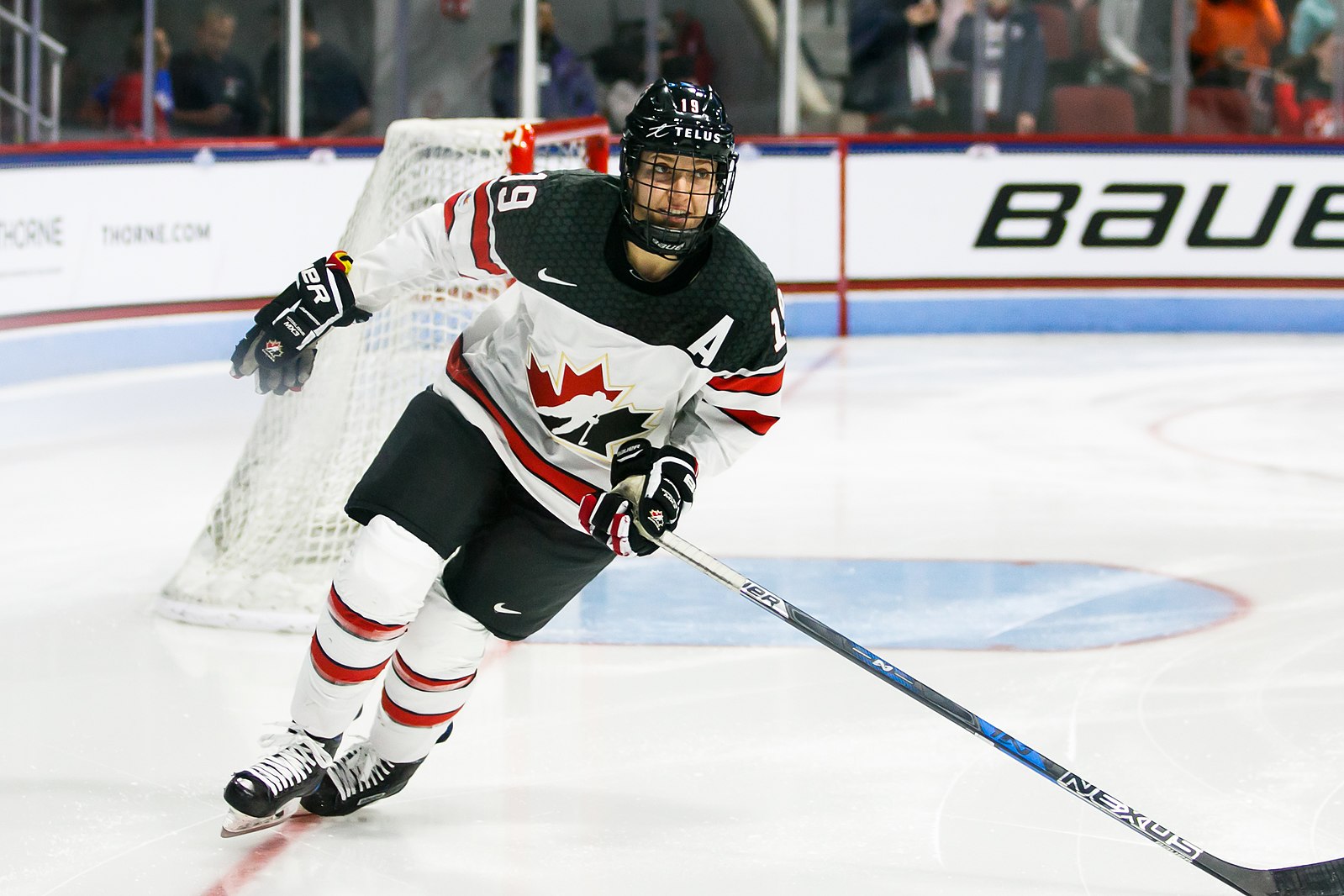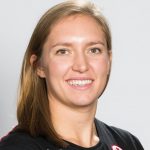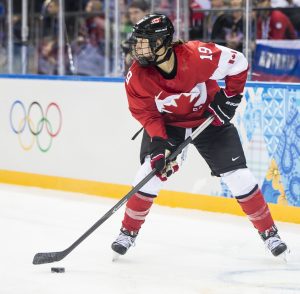
When you relinquish something of worth, you want to recapture it. Especially if it was gold.
Team Canada forward Brianne Jenner can attest to that. The three-time Olympian won a gold medal at her first Winter Olympic Games in 2014 in Russia, settled for silver after a shootout with the U.S. in South Korea in 2018, and then helped Canada to gold once more in Beijing in February.

“This group was really special,” said Jenner of Team Canada 2022. “It was the most fun season I’ve had. What we were able to do, bringing the program back, was capped off in Beijing, and I feel so grateful to be a part of the story.”
The former Cornell star was more than just part of Canada’s latest hockey medal run. On a team featuring the likes of Marie Phillip-Poulin (17 points) and Sarah Nurse (13 assists), it was Jenner, 31, who was named Most Valuable Player in women’s ice hockey at the 2022 Olympic Winter Games.
The Oakville, Ontario, native tallied nine goals and 14 points in China, and also set up the gold-medal-winning goal by Poulin in a 3-2 victory over the United States in the final.
“Someone told me afterwards,” recalled Jenner of her selection. “I was so focused on the game. You don’t go for MVP, you go for gold. It’s a team sport, and we were so focused on having a great team together.”
Not that such an accolade doesn’t look good with two gold medals and a host of other awards on her mantle.
“It’s a huge honor,” she said. “I didn’t go in with that goal, and it usually goes to whoever gets the most goals,” she quipped.
She said that Poulin and Nurse both had great tournaments, and that “so many played roles” that were required, like blocking shots and other mundane but vital tasks that often add up to winning hockey.
“It gave us success,” said the 5-foot-9 Jenner, who normally lines up at center.

The Canadian team also didn’t let unexpected distractions deter it in its Olympic quest, whether it came to regular COVID testing, or having to wear masks in a game against Russia as a precaution, after COVID tests for Russian players had not been fully processed by game time in Beijing.
“We made a pledge to each other, through the ups and downs, to stay focused on what we could control,” said Jenner. “It was kind of poetic we had to play in masks (after practicing in them).”
Former Harvard netminder Emerance Maschmeyer made her Olympic debut in that contest, stopping 11 shots for Canada in a 6-1 victory, despite an hour-long delay before the opening face-off.
“A shout-out to Emerance,” said Jenner. “She handled it like a champ.”
Jenner also thanked team physician Tina Atkinson for her efforts in Beijing in keeping Canada’s roster healthy, and called her the real MVP for handling difficult situations.
“We wouldn’t have made it without her,” she said.
Jenner now has two gold medals and one silver medal in her Olympic collection, but she’s not taking any of those appearances for granted.
“It’s never old hat, once you get a taste,” she admitted. “We were not happy in Pyeongchang, and it was motivation.”
She said the celebration in Beijing this year was as much for teammates who hadn’t won gold before, or who were making their Olympic debuts.
“You never want to come up short,” said Jenner. “We let go of past seasons, and gave ourselves permission to be confident and go ahead and chase two golds in one season.”
That includes this year’s IIHF Women’s World Championships in Denmark in late August/early September, the first time the women’s top division will be contested in the same year as the Olympics. Canada won last year’s Worlds in Calgary, beating the U.S., 3-2, in OT in the final. Assistant captain Jenner finished second in tournament scoring with 11 points in six games, including an assist on Poulin’s gold medal-winning goal.
It was a performance Jenner has been providing since almost she first strapped on skates. After skating for Stoney Creek (PWHL), Mississauga (CWHL) and Burlington (CWHL), all in her native Ontario, Jenner starred at Cornell for four seasons, from 2010 to 2015, while taking off to compete in her first Olympics in 2014.
In 129 career NCAA outings with the Big Red, she registered 93 goals and 136 assists for 229 points, and still stands second on Cornell’s all-time scoring scroll. She was also a four-time finalist for the Patty Kazmaier Award as the nation’s top player, and also helped Cornell to two NCAA Frozen Fours.
She still keeps tabs on the Big Red all this time later, especially since her college head coach, Doug Derraugh, was one of Canada’s assistants at the 2022 Olympics.
“For sure,” she admitted. “Coach Derraugh and I talked all year, to see how the team was doing.”
She recalled her own tenure skating for the Big Red, and how those four seasons in upstate New York helped her to elevate her play to the standard she now features in international play.
“It’s hard to quantify how much I developed those years,” she admitted. “It made me a better player and athlete. My teammates pushed me, as did Coach Derraugh, and learning from his hockey excellence.
“I learned how to practice and compete at a very high level,” added Jenner, with work ethic being one of her cornerstones. “It’s ingrained in the culture at Cornell, and it was really challenging.”
That included academics, with Jenner ultimately earning her bachelor’s degree in government. She was also a four-time All-Academic Ivy League selection, and later added a master’s degree in public policy from the University of Calgary.
“She’s just a really cerebral person,” said Derraugh to CBC.ca, prior to this year’s Olympics. “Someone who thinks before she speaks, and somebody who also approaches the game that way.”
After finishing her college career with Cornell, Jenner joined the ever-changing professional women’s hockey landscape, in-between stints with Canadian national teams. She’s continued to score at the pro level, as she tallied 51 goals and 114 points in 103 games in the Canada Women’s Hockey League (CWHL) from 2015 to 2019. She also captained the Calgary Inferno to a pair of Clarkson Cup playoff titles in that now-defunct circuit.
Jenner believed there’s opportunity for women’s hockey to grow at the professional level nowadays, but added that investment is required, especially in marketing efforts.
“The product is at the highest level it’s ever been,” she said. “There’s an enormous fanbase that wants to see it. I believe it’s just around the corner.”
She added that a lot of work has also been done over the last few years, with corporations showing an interest at a greater level, which can only bode well for female skaters.
“I believe there’s a greater appetite for women’s hockey beyond the Olympic cycle,” said Jenner.
Following the Olympics, Jenner’s focus was on spending time at home with her wife and new daughter, particularly after families were not allowed to attend the Games in Beijing. She was also preparing for the World Championships, while working as much as possible with the PWPHA (Professional Women’s Hockey Players Association) to make women’s hockey more sustainable and “truly be professional.”
As an amateur, Jenner caught the hockey bug early in life, at home. Her father, Dave, was a goaltender for the Soo Greyhounds, Kitchener Rangers and London Knights, all from the old Ontario Major Junior Hockey League, and also backstopped the University of Toronto in his playing career.
“My dad was a huge figure in my career,” admitted Jenner.
Even if she didn’t follow him into the crease.
“He played at a high level, but I didn’t love (playing) goalie,” she laughed. “He ran youth hockey camps while I grew up, and I fell in love with it at an early age.
“He wasn’t your typical hockey dad,” she added. “There was no pressure on me. I just followed my passion, and that’s one of the greatest things he did. He gave me opportunities to follow, and I’m very grateful for his influence on my career.”
That career will resume in Denmark — with perhaps more Canadian gold waiting at the conclusion.

